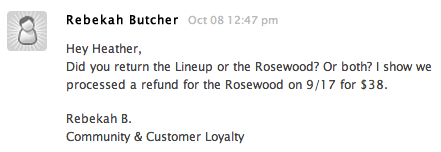 I’m moving ZOZI from Zendesk’s helpdesk software to UserVoice‘s (full disclosure: I used to work at UserVoice). As part of my due diligence there was one important thing I had to investigate: the “pending” status.
I’m moving ZOZI from Zendesk’s helpdesk software to UserVoice‘s (full disclosure: I used to work at UserVoice). As part of my due diligence there was one important thing I had to investigate: the “pending” status.
Zendesk has a few statuses for support tickets: new, open, pending, and solved. UserVoice goes the simple route with simply open & closed. ZOZI, like many companies, uses the “pending” status to indicate that we’re waiting to hear back from the customer. If we don’t hear from the customer after x days, we reach out and remind them that we’re waiting to hear from them. This is often folks whose problems we think we solved, but we want to verify.
(It’s worth noting that when we were developing UserVoice’s helpdesk we interviewed dozens of people who used Zendesk and found that, overwhelmingly, most folks used “pending” to represent tickets they needed to follow up on…but most of these people also admitted they never ended up following up on said tickets.)
My mission: to discover whether setting tickets to “pending” was a positive practice that results in more clarity for customers and higher satisfaction ratings for us…or a waste of our time. I looked at 20 tickets that had been “pending” and 20 tickets that were never set to “pending”.
 When we sent follow-up emails to customers whose tickets were “pending”, only twice out of the 20 instances did the customer actually respond to the follow-up.
When we sent follow-up emails to customers whose tickets were “pending”, only twice out of the 20 instances did the customer actually respond to the follow-up.
Both times they did respond, the customer was waiting on a third party (we work with vendors who actually run the fantastic experiences we sell). They appreciated the follow-up because they had not heard from the vendor.
There were no satisfaction scores given on any of the “pending” tickets that were followed up on. However, there were two (positive) satisfaction ratings to 20 random tickets that did not use the “pending” status.
My Conclusions:
- EXCEPTING cases where we’re waiting on a third party, users do not respond to pending follow-ups. If they didn’t respond before, they’re not going to respond now.
- Pending follow-ups do not increase customer satisfaction. Again, they were already done with us.
- Pending tickets are in fact less likely to get any sort of satisfaction ratings for the same reason.
Although I wouldn’t call this entirely scientific, it’s my conclusion that the “pending” status and process doesn’t actually benefit our users. Customers who don’t respond, won’t respond. Instead, it wastes agent time and may annoy the customer. We will likely be leaving tickets that are waiting on vendors “open” in UserVoice, as it seems clear that this is the one situation in which checking in is useful. But other than that, we’ll happily leave “pending” in the dust.
Photo courtesy of Delwin.
Updated 11/11 to disclose relationship to UserVoice. Updated 11/12 to provide information on UserVoice’s user research when developing our helpdesk product.

 “The new feedback form was plugged in and and went live a couple of weeks ago. We’ve already had a 65% increase in users completing the feedback form which has blown us away! Taking the time to make the feedback process easier and more consistent with our tone is already paying dividends.”
“The new feedback form was plugged in and and went live a couple of weeks ago. We’ve already had a 65% increase in users completing the feedback form which has blown us away! Taking the time to make the feedback process easier and more consistent with our tone is already paying dividends.”